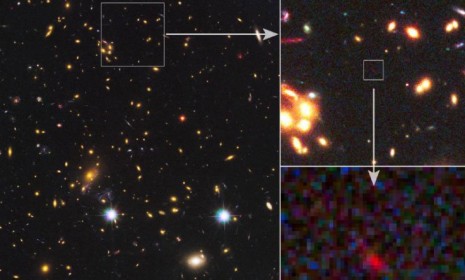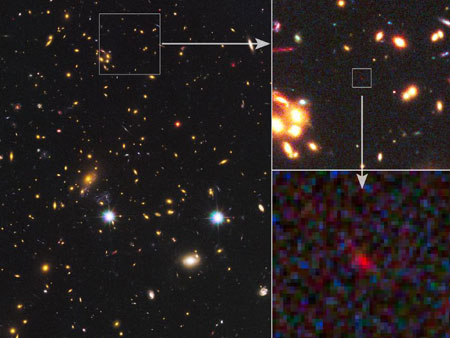Discovered: A far-off galaxy from the dawn of time
A fuzzy red splotch hidden behind nearby star clusters might just be the most distant galaxy ever glimpsed by human eyes

A free daily email with the biggest news stories of the day – and the best features from TheWeek.com
You are now subscribed
Your newsletter sign-up was successful
After the Big Bang, the mysterious creation event that birthed the universe, it took hundreds of millions, even billions of years for the void of space to fill itself with the galaxies and cosmic clusters we can observe today. Very little is understood about this infant period, a "cosmic dark age" when stars and planets were just beginning to form. But now, for the first time, astronomers have spotted a far-off galaxy believed to be born in this period, astonishingly close to the dawn of time. Here's what you should know:
What did scientists find, exactly?
Astronomers caught a glimpse of what they think is the most distant galaxy ever seen. While it doesn't "look like much," the "fuzzy red orb" is an astonishing 13.2 billion light years away, says Rebecca J. Rosen at The Atlantic. That's not much older than the universe itself, and this tiny galaxy may have emerged less than 200 million years after the Big Bang. It's like an archeologist finding an incredibly old artifact that's still relatively intact.
The Week
Escape your echo chamber. Get the facts behind the news, plus analysis from multiple perspectives.

Sign up for The Week's Free Newsletters
From our morning news briefing to a weekly Good News Newsletter, get the best of The Week delivered directly to your inbox.
From our morning news briefing to a weekly Good News Newsletter, get the best of The Week delivered directly to your inbox.
How did they find it?
John Hopkins University's Wei Zheng and his colleagues used NASA's Hubble and Spitzer space telescopes to search for galaxies hiding behind massive star clusters blocked from Earth's immediate field of vision. Together, the two telescopes caught five distinct wavebands that, although warped, could be combined to paint a faint composite of this far-off star system.
What can we learn from it?
Researchers have pinpointed more than 100 galaxies born some 650 million to 850 million years after the Big Bang, but this is by far the oldest on record. Zheng and his team hope that studying it further will fill in history's gaps and give us a clearer picture of what the universe was like during this little-understood infancy, says Irene Klotz at Discovery News. The team expects a better picture to emerge when the Hubble's replacement, the powerful James Webb Telescope, launches in 2018.
A free daily email with the biggest news stories of the day – and the best features from TheWeek.com

Sources: The Atlantic, Christian Science Monitor, Discovery News, Space.com
-
 Film reviews: ‘Send Help’ and ‘Private Life’
Film reviews: ‘Send Help’ and ‘Private Life’Feature An office doormat is stranded alone with her awful boss and a frazzled therapist turns amateur murder investigator
-
 Movies to watch in February
Movies to watch in Februarythe week recommends Time travelers, multiverse hoppers and an Iraqi parable highlight this month’s offerings during the depths of winter
-
 ICE’s facial scanning is the tip of the surveillance iceberg
ICE’s facial scanning is the tip of the surveillance icebergIN THE SPOTLIGHT Federal troops are increasingly turning to high-tech tracking tools that push the boundaries of personal privacy